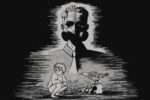“Parable of the Sower” by Octavia E. Butler is an engrossing sci-fi novel written in a journal format. The first time I read this book was as a preteen, and it has reigned since that day as my most highly recommended book. It was years later when I picked up “Parable” again that I was shocked to realize how much I recognized and related to the picture Butler paints of a crumbling American society.
Butler’s clear vision of future societal issues brings the emotional and philosophical impact of the story to the here and now, making the story incredibly poignant and relevant. Re-reading “Parable” as an adult is eerie, seeing how many current societal issues we are struggling with today were predicted clearly in pages originally printed in 1993.
“Parable of the Sower” is a story about Lauren Olamina, a girl living in the year 2024, trying to figure out her future in a world on fire and consumed by economic chaos. Located in Los Angeles and shut off from the hostile world in their walled cul-de-sac neighborhood, Lauren and her family struggle to make sense of, and survive in, a country torn apart by climate change, drug abuse, racial issues, societal violence and economic divide.
After her home and community are attacked and destroyed by drug addicts and the desperately poor looking to survive, Lauren treks hundreds of miles on foot, using freeways as walkways since gas has become too difficult to procure, to reach the north in hopes of finding safety and ample water.
The story follows Lauren during her escape from the wasteland that is LA, through the violence-riddled Bay Area, then finally north to Oregon, where the water falls from the sky in abundance.
Against this dystopian backdrop, Lauren Olamina is in the midst of creating a new religion to make sense of the increasingly changing world she lives in. Butler uses fire and destruction to reinforce the depth of meaning behind the first verse of Lauren’s new religion: “All that you touch You Change. All that you Change Changes You. The only lasting Truth is Change. God is Change.”
Fire, drug use and societal destruction are also elements used in “Parable of the Sower” to juxtaposition Lauren’s search for internal meaning against the meaningless consumption and selfishness inherent in consumerist American culture. Raised as a strict Baptist, Olamina finds that her childhood religion does not help her to understand the changing world or make peace with her universe as it is.
The country is burning itself to the ground for several reasons: a divisive new President who wants to make America great again begins defunding science and social welfare programs; virulent gun violence has swallowed the public; and a new, highly addictive drug called Pyro is becoming popular on the streets, with users willing to do anything for the drug. Substance abusers live only for the flames, happily letting anything that catches fire burn to the ground. The soul-destroying nature of this new drug is amplified by the drug user’s complete disregard for their surroundings, sacrificing everything to the flames — including themselves.
Water scarcity is another theme in Butler’s book that resonates with climate change issues we are facing today. Lauren Olamina’s world is dry and dusty, filled with Santa Ana winds that desiccate the brown landscape. Rain is scarce, with only the oldest children remembering a time when water fell freely from the sky. Street gangs and the government control any running water, charging exorbitant amounts to the already poor population. Water scarcity drives up food prices, and after her family is killed and her home destroyed, Olamina begins her long journey to the north in hopes of finding a place with cheap water where she can grow her own crops.
Water scarcity is a serious issue facing the American West in the real world right now. Fights over the allocation of water from the Colorado River Basin have grown rabid as the West deals with a megadrought with no end in sight. As climate change progresses, we can expect less and less rain in California, emphasizing the relevance of Butler’s themes of human-caused climate change, economic have and have-nots and the true cost of poverty.
Butler also explores themes of race, sex and security throughout her story, weaving these elements together to create an immersive novel that challenges the reader to think ahead twenty years to where their society could end up. Lauren Olamina is a tall, strong, young Black woman from a mixed-race family. The societal tension between people of color and white people has risen sharply in the world of “The Parable of the Sower” because it is unusual to interact with another race other than your own.
Lauren dates a white boy within her cul-de-sac community and is openly questioned by other young women of color about her choice to be with a white person. While Lauren defends her choice, she is acutely aware of the racial issues in her society. She is also unusual compared to her neighborhood friends because she takes control of her reproduction, choosing to practice safe sex with her boyfriend rather than let nature take its course with the laissez-faire attitude of the rest of the community. Pregnancy is a risk she cannot take. She is terrified of bringing a child into a world of such uncertainty, where she does not see any security, hope or a map to a better future.
When Lauren must escape from her burning home to travel and live on the violent streets, she finds security by disguising herself as a man. Being a woman living on the streets would make her a target for sexual abuse, but men tend to be safer from attack.
Playing on this gender safety, Lauren uses her male persona to help protect people she sees being victimized as she journeys along the highways towards the north. As she grows her religion and her flock, she realizes that safety and security is something she can forge amongst her chosen family, even when she cannot find it inherent in the world.
Octavia E. Butler does an amazing job with this coming-of-age novel, crafting a world that is both realistic and acts as a warning for our future. Our society has already have gone down many of the paths explored in “Parable of the Sower,” as though Butler was the oracle of the American West.
I encourage you to read “Parable of the Sower” and reflect on what we can learn from Butler and Lauren Olamina about how to build a better future.
















